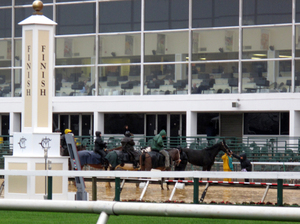
The finish line and grandstand at Pimlico Race Course, home of the Preakness. The track has had trouble competing with rival tracks that offer other gambling options, such as slot machines.
The finish line and grandstand at Pimlico Race Course, home of the Preakness. The track has had trouble competing with rival tracks that offer other gambling options, such as slot machines.
Races between thoroughbred horses have been held in the United States since the 1600s. With the second jewel in the Triple Crown series ? The Preakness ? set to run Saturday, its host racetrack is struggling to balance its books.
A 2005 study says that racing directly impacts the U.S. economy to the tune of $10.6 billion a year. And yet, there's been hand-wringing in Maryland, which hosts the Preakness, over whether an industry that's been losing millions of dollars a year can survive.
There's something about racing that makes the hearts of enthusiasts beat faster ? and fills racetracks to the brim with screaming fans. They'll be at this year's Preakness, to see if the colt Animal Kingdom, winner of the Kentucky Derby, takes another step toward history.
But Pimlico Race Course isn't always as packed as it is for its biggest race. On a recent rainy day, the nation's second-oldest racetrack is almost empty. Veronica Hegarty's been coming here since she was a little kid. She says the crowds have fallen off, and that Pimlico looks its age.
"It's a shame, what's happened to racing," she says. "Especially here in Maryland."
The Maryland Jockey Club is trying to attract a new crowd to Pimlico, holding events like a wine festival in the infield. Baltimore resident Denise Hill came and had a blast, finding a new passion for betting on horses.
"It's a great time; it supports the state," Hill says. "And when I win, it's even better."
Hill says she'll be back; so did many others at the festival who came both for the wine and for the horse racing.
Still, Tom Chuckas, president of the Maryland Jockey Club, says the Pimilco facility lost $10 million last year, despite the annual millions the Preakness brings in. Now the Jockey Club is trying to widen its fan base beyond the traditional racing demographic, where most fans are in their fifties.
"We have to become much more multi-faceted and provide other things in the facility," Chuckas says.
For big race days like the Preakness, Pimlico will have bands, more food vendors and other touches. The club is getting millions in subsidies from slot machines elsewhere in the state for the next three years, for operating expenses. There are no slots at Pimlico or its sister track, Laurel Park. And, Chuckas says, they aren't alone in their battle for revenue.
"If you look at horseracing across the United States, almost every racetrack is having some difficulty," Chuckas says. "Now, the tracks that are called 'racinos' ? that, they have gaming there, and so on ? they obviously have a revenue source that can work with horse racing, to bolster it."
Hollywood Casino at Charles Town in West Virginia has a track where night horses races are run ? and a huge casino. It's owned by Penn National Gaming ? which owns more than 20 racing and gaming facilities in several states. It's also the minority owner of the Jockey Club, which operates Pimlico and Laurel.
Penn spokesman Eric Schippers says that for the horse racing industry to flourish, slot machines must be involved.
"The long term viability of racing ? not just in Maryland, but everywhere across the country ? is largely dependent on the eventual introduction of slot machines," he says.
But not everyone buys that scenario.
"It's kind of a complicated situation," says Tom LaMarra, news editor of bloodhorse.com.
LaMarra has covered the industry for 18 years. He says he doesn't think that horse racing is doomed without slots. He says that decades ago, the only legal places to gamble were at racetracks or in Las Vegas and Atlantic City.
But now, gamblers have more choices, from various lotteries to casinos scattered across the nation. And in the Mid-Atlantic region, where there are several tracks within a few hours of each other, LaMarra says some consolidation might work.
"At some point, I think everyone will need to sit down and say, 'Okay ? we need to coordinate stakes schedules,'" he says. "We may even need to coordinate racing dates."
Chuckas says the industry's challenge in Maryland is to create a long-term solution that is viable. Under the legislation that provided the slot machine subsidies, the Maryland Jockey Club must submit a five-year business plan to the legislature by Dec. 1, showing how it will maintain year-round racing at a racetrack without the help of slots.
Source: http://www.npr.org/2011/05/21/136499967/horse-racing-gets-squeezed-by-gamblings-spread?ft=1&f=1055
No comments:
Post a Comment
Note: Only a member of this blog may post a comment.